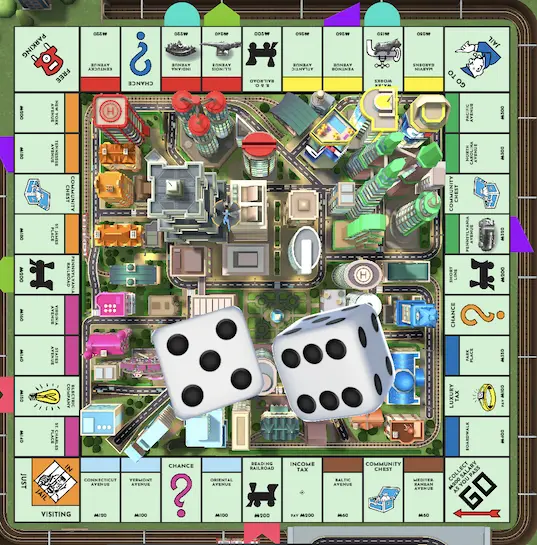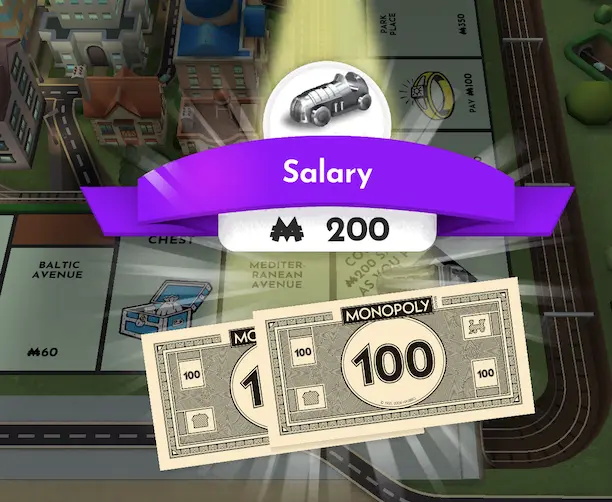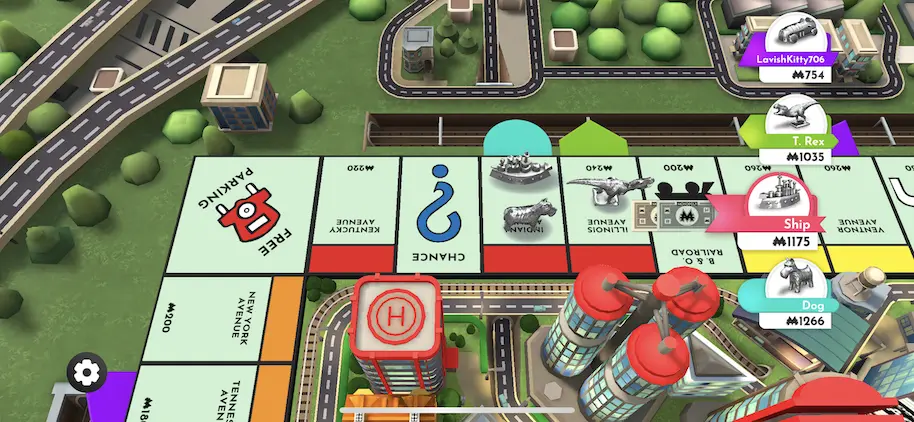by Stuart Urback
Monopoly feels ubiquitous; it’s as visible in living rooms as chess sets are in hotel lobbies. While the game might be everywhere, it’s striking how most conversations revolve around having to play with family or friends — the stretches of boredom, the randomness. Which led me to the question, do people actually enjoy playing? Monopoly isn’t on the cusp of becoming a major e-sport (Magic the Gathering) and it does not have a major motion picture being developed for it (Catan), yet it still has the cultural power as “that game everyone plays with family”. As pop culture moves towards a greater appreciation of indie and more complex titles, Monopoly persists.

People tend to assume I don’t recommend Monopoly because I dislike it, or think it’s bad but it’s simpler than that: I don’t recommend it because I don’t think people will enjoy it. But Monopoly holds a soft spot in my heart. It was one of the first games I tried convincing my family to create a regular game night to play. It was one of the first games I formally studied in college, for a class on American consumer culture. I even designed a drinking game on top of it during my senior year of college.
While Monopoly hasn’t been around for the centuries or millennia of other games like Cribbage, Hearts, or Chess, it has been around for a long time, long enough to span multiple generations and become a tradition. As the story goes, it started life as The Landlord’s game by Elizabeth Magie in 1904, an example of the dangers of capitalism. The goal was to convince people that the dangers of land ownership were real, but the excitement of the design won out. Playing at being a capitalist was just too fun. It was purchased by the Parker Brothers in 1935 and caught on during the Great Depression as families were looking for an escape out of their dire situation. If you’d like to learn more, I’d highly recommend 99 Percent Invisible’s The Landlord’s Game episode or Monopoly: The World’s Most Famous Game by Philip Orbanes.
It would be easy to equate the success with the weight of the world’s largest toy and game company — Hasbro — putting so much marketing effort behind it, but that would understate Monopoly’s power as a concept and some hidden lessons behind its design success as a game. I’m going to explore themes that explain why Monopoly has managed to be such a success and recommend smaller games that can be found on Amazon for $35 (though I encourage you to purchase them from a local game store!) that fill a similar niche.
Playing a Monopoly Feels Like Being A Capitalist
If you look at Monopoly primarily as a competitive economic experience where people are matching wits to try to destroy each other, the randomness and length feel crushing and un-fun. But Monopoly gets played because play-acting as a real estate capitalist is fun. Throughout the game players get to wheel and deal with high stakes trades, experience the whims of the chances of the market (the roll of the dice), and feel the thrill of victory and defeat is a compelling story. Compared to other, more modern experiences, with mathematical precision and balance, where each player decision leads to success or defeat, Monopoly is looser, more random, but still very fun.

It might sound trivial, but the act of counting money is a fun part of what it means to play Monopoly. Most modern games have shrunk this role by counting in units of 1, 3, and 5. Monopoly goes big, with $100 and $500 bills. Making change, exchanging cash for that property card, organizing your cash into the right denominations was fun. There was even a version of Monopoly that used a credit card swipe mechanism to track money instead of the cash. While that might seem like a potential efficiency win, I suspect it was more about cashing in on that feeling of the swipe and “cha-ching” moment to reinforce the feeling of being a big spender.
The next step from cruising around town and buying stuff is trading it with your competitors. Trading in Monopoly is the real heart of the game. Trying to convince your fellow players to give you the deal you want is the path to collecting your just-desserts. It’s interesting from a design perspective that this core is so hidden. In more modern games, like even Catan, the trading is explicit (it’s even possible in that game to trade directly with the bank). While this makes it less likely players will trade, it also means people who choose to trade are doing so because they want to be there, and the stakes are higher as a result.
It’s a game about accumulating stuff. The goals are visceral and accessible: bankrupt your opponents by having more stuff than them. You do that by exchanging money for property, and then for house and hotels. The more property, houses, and hotels you have, the morel likely your opponent is to go bankrupt when they land on your space. Many board games, especially modern ones, are fairly abstract: players compete by trying to score the most points. In Monopoly the components which represent your score also relate to the character you’re playing. (quick aside, I really don’t understand how houses upgrade into hotels, unless we’re talking about an Airbnb situation here)
Monopoly is impressive because playing to feel like a capitalist and playing to win are one and the same. If you’re looking for games that feel like building, trading, or dealing with property, you can’t go wrong with Welcome To..., Bohnanza, For Sale, or Bargain Quest. Welcome To... is a game about building your own suburban paradise, but the real benefit is that any number of players can play, and features no direct interaction, so it’s great for large numbers of players and playing remotely. Bohnanza is a zany (it’s about bean farming), the core mechanic is fun, and you’ll find yourself trading over and over again as you try to craft that perfect bean farm. If you especially enjoy the auction phase in Monopoly, I would recommend For Sale!, it’s a quick game for 3-6 players about flipping houses. Finally, if you’re looking for something a bit more challenging, in Bargain Quest you are the shopkeeper, selling heroes with the equipment and spells they need and then sending them off to their doom.
It Reinvents Itself
While it might seem like Monopoly is always only the game it’s always been, this isn’t an entirely complete picture. The brand Monopoly has expanded through the years to include a variety of different spinoffs, both in theme and content. Most obviously there have been plenty of crossovers, from a Nintendo Monopoly to an Avenger’s Monopoly and even a Bass Fishing Monopoly variant, but while different versions have come and gone, the core rules remain the same.
Since 1990, and accelerating more recently Hasbro has released additional variants that tweak the game to target new players or different experiences. This would seem to correspond with the increase and explosion of new hobbyist style games in the United States. In 1990, Monopoly Junior simplified the amounts and the property ownership so that kids as young as five could play. In 2006, the Mega Edition incorporated the concept of a speed dice to move play along more quickly and in 2007 Electronic Banking introduced the concept of credit cards to track money instead of cash, keeping the money management aesthetic with the swipe of a credit card. More recent games have transitioned away from the “last person standing” to a race to the most number of points, mimicking other hobbyist style “euro games”. There’s also Monopoly Cheaters from 2018 which encourages cheating, in a clear nod from designers to the experience that many players have. This is not a comprehensive list, but gets at the idea that a lot of effort has been put into keeping Monopoly current. It’s not just a matter of spending marketing money or getting the best slot on the shelf on a Target.
There have also been games that have different mechanics with similar theming. Monopoly Deal, a small card game spin-off, is one of my favorite casual games to play (it’s easy, fun and only takes about 10 minutes for 4 players). And Monopoly Tycoon was one of my favorite video games growing up (I still wish it would get remastered, so I could play it again). It was a real-time strategy game about trying to develop property on a busy street block.
It’s easy to assume that Monopoly is a force of nature, and that due to its market dominance but a lot of effort goes into reinventing even standard games. I used to assume that not much effort went into companies like Hasbro when they produced their games. But a lot of design talent gets built up by these companies, even if the focus is ultimately on creating tweaks and nudges rather than bold re-imaginations.
If you’re interested in trying a new twist on a classic, recently games like Sudoku and Hearts have experienced a resurgence in popularity. For Sudoku, the popular video Miracle Sudoku spread around the internet capturing the simplicity and joy of deductive problem-solving. The channel, Cracking the Cryptic has published a series of apps like Miracle Sudoku or Chess Sudoku which are modern twists on the traditional puzzle. Zach Gage created his take on the game, focusing more on teachability and UX with Good Sudoku. In the board games, The Crew and Fox in the Forest are both innovative takes on the traditional card game of hearts. Traditional games with twists are a good way to explore new concepts while being relatable enough for new players to understand them.
It's a Flexible Canvas
Most people are actually playing some part of Monopoly ”wrong”. Giving away free money on the “Free Parking” corner space, or ignoring the “auction rule” for unsold properties are two of the most common, but there are many, many more. At first my perspective on this was surprise and understanding. Obviously people hate this game, they’ve been playing it wrong! Or, clearly this is a design flaw if people don’t even know how to play the game. But on further reflection, I actually think this sort of variability is what makes Monopoly so resilient.
Playing the rules correctly changes the shape of the game, but that doesn’t necessarily mean it would be better. In many modern games there is more precision about what happens and when, which leaves less for a players' imagination to tweak and change the game. One of the areas I notice introducing hobbyist games to friends is how bad it can feel to realize you’ve gotten a rule wrong the entire game: it can make you feel like the result of the game is a mirage.
Monopoly’s emphasis on the activity of playing as a capitalist rather than a specific ruleset means that it can withstand more mistakes and issues. As long as you’ve got the feel right, the rest of the game will come along with it. In some ways this makes Monopoly feel more like a “Game System” or a set of pieces on which multiple different types of games can be played, like a standard 52 card deck. The components are so attractive and fun to toy with that they’ll find themselves incorporated in other games or mashed up in new ways.
Games that are flexible and give a wide berth for players to experiment and do what they want can be hard to find, especially on the indie scene. A lot of these games feel pretty strongly designed because designers want to give you a specific experience. While Dungeons and Dragons can feel hard to get into, it can be cheap if you know a DM, and the game truly lets you explore whatever elements you feel like. Other games like Monikers (also called The Fishbowl game) can be structured and changed how you see fit. The reason I'm a fan of the paid version of Monikers, is having cards and concepts pre-written (with helpful examples) is a good way to make sure everyone can pick things they know. Wavelength is theoretically a competitive game, but the most fun I’ve had has been treating it as a collaborative or cooperative experience.
In Conclusion
Monopoly is a flawed giant. It’s certainly propped up by the weight of history and a large multi-national corporation’s marketing, but it also has a number of intrinsic qualities that make it a sticky game, likely to be remembered (and passed down) even if it’s not a game that crafts incredible stories or strategic experiences. Monopoly is a great example of the depth and breadth that games have to offer, of the challenges that games have that are unique to the medium, and the opportunity for shared cultural experiences to evolve even as they remain similar to experiences.

One more thing
If you made your way through this article and felt like it was missing the “screw over your friends and family” element, I have just the game for you. I even wrote about it on this site! It’s called Cockroach Poker, and it’s the perfect distillation of a gotcha game into a 40 card deck.
The opinions in this post are expressly the views of the author and do not reflect the views of their employer(s) or any entities that they might otherwise be affiliated.